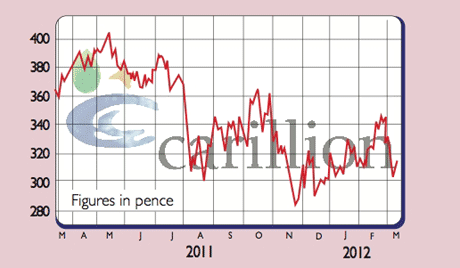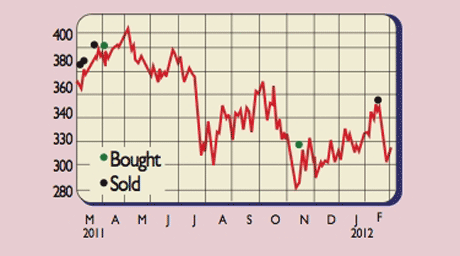Shares in focus: Build some income into your portfolio
Carillion's growth days may be over, but its shares pack an attractive yield. So, should you buy this support services giant? Phil Oakley investigates.
Get the latest financial news, insights and expert analysis from our award-winning MoneyWeek team, to help you understand what really matters when it comes to your finances.
You are now subscribed
Your newsletter sign-up was successful
Want to add more newsletters?
The business
Carillion is one of the UK's biggest support services companies. It looks after thousands of buildings for customers such as the Ministry of Defence and BT. It is also plays a significant role in the maintenance of road, railway and utility infrastructures, as well as providing heating and renewable energy for businesses and domestic customers.
Carillion has been a major participant in private finance initiatives (PFIs) in the UK and Canada and in working with governments via public private partnerships (PPPs) to build public- sector infrastructure such as schools, hospitals and roads. It also has a significant presence in the UK construction sector and is focused on growing its construction business in Canada and the Middle East.
The history
Carillion was created from the spin-off of the construction and business services unit of Tarmac plc in 1999. As an independent company, it set about trying to create a more resilient and predictable business, not based solely on construction activities. There were some setbacks when it lost its position in rail maintenance after Network Rail decided to do the work itself.
Try 6 free issues of MoneyWeek today
Get unparalleled financial insight, analysis and expert opinion you can profit from.

Sign up to Money Morning
Don't miss the latest investment and personal finances news, market analysis, plus money-saving tips with our free twice-daily newsletter
Don't miss the latest investment and personal finances news, market analysis, plus money-saving tips with our free twice-daily newsletter
However, it stuck to a strategy of investing heavily in PPPs during the early 2000s while growing its support services business. Buying other construction and support services companies significantly boosted profits. In 2006, for example, it bought Mowlem, followed by Alfred McAlpine in 2008.
These businesses made Carillion one of the biggest UK support services companies. They also allowed it to make very large cost savings and post successive years of strong profits growth. Since becoming an independent company, profits available to shareholders have more than tripled and dividends have increased fourfold.
The management
Richard Howson has been chief executive since January 2012. Having worked for Carillion for over 16 years, he was previously head of the group's Middle East business and group chief operating officer. He was paid £902,000 in 2011.
Another key figure is Richard Adam, Carillion's finance director. He has an impressive track record in managing company finances, most notably at Associated British Ports. There, between 1999 and 2006, along with the chief executive, he played a major part in restoring the fortunes of the company.
Should you buy the shares?
The more predictable profits from support services provide much more reassurance for an investor than those from construction. But can this business grow? Support services makes up half of Carillion's profits, but have hardly moved since 2008. What growth there has been has mostly come from cost savings. It looks like 2012 will see this theme repeated, with cost savings from the purchase of Eaga plc being the main profit driver.
The outlook for outsourcing is difficult to call given the weak UK economy and tough competition. Carillion has work to do here. On the positive side, it should still be able to realise value from its PPP portfolio and the outlook for its Canadian and Middle East construction businesses is good.
At 315p, Carillion shares look very cheap, trading on 7.2 times 2012 forecast earnings. But be careful. A large chunk of profits still come from construction, where poor profit margins and earnings visibility quite rightly command a low stockmarket rating.
Another point to consider is Carillion's low tax charge of 15%. This is mainly down to the fact that Middle East profits are subject to little, or no, tax. This cannot last forever.
That said, Carillion's dividend yield (at 5.6%) is attractive, looks safe and will probably grow. This is the main reason to buy or hold the shares just don't expect the share price to rocket from here.
The numbers

Stockmarket code: CLLN
Share price: 315p
Market cap: £1.35bn
Net assets (Dec 2011): £983m
Net debt (Dec 2011): £51m
P/e (current year estimate): 7.2
Yield (prospective): 5.6%
What the analysts say
Buy: 11
Hold: 6
Sell: 2
Average price target: 370p
Director Shareholding

R Howson: 40,014
R Adam: 132,203
P Rogerson: 39,630
Get the latest financial news, insights and expert analysis from our award-winning MoneyWeek team, to help you understand what really matters when it comes to your finances.
Phil spent 13 years as an investment analyst for both stockbroking and fund management companies.
-
 What do rising oil prices mean for you?
What do rising oil prices mean for you?As conflict in the Middle East sparks an increase in the price of oil, will you see petrol and energy bills go up?
-
 Rachel Reeves's Spring Statement – live analysis and commentary
Rachel Reeves's Spring Statement – live analysis and commentaryChancellor Rachel Reeves will deliver her Spring Statement on 3 March. What can we expect in the speech?